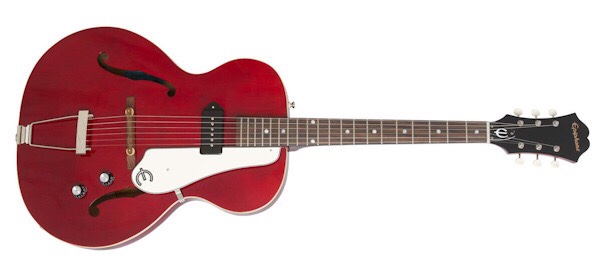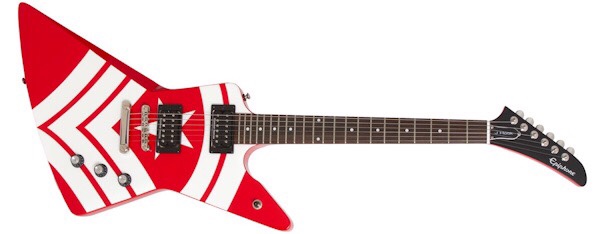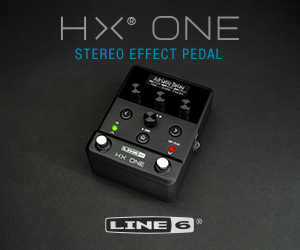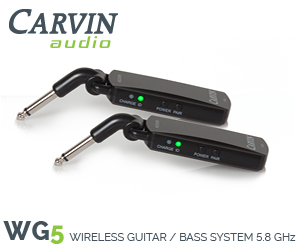Red Alert — Incoming from Epiphone!
Phil Smith | Feb 21, 2019 | Comments 0
Every time I’m about to write an editorial/opinion article, I’m trying to write a story mainly based on two major components, facts and experiences. I also generally try to not make it about me, but we cannot ignore we never know any better experiences that the ones we lived and experienced ourself directly. So I’m gonna need to give you a little bit of background about me. Some of you might have a different background, or maybe even disagree with me at first but just bare with me and keep reading, you might get surprised by how things finally turned out, because I was also surprised myself.
I started to play music when I was around 10, but I wasn’t playing guitar at all. At the time, I was playing Drums (and that’s a complete different story on its own). By the age of 13 I was doing my first local concert in front of 200 people (mostly family and friends… but hey, it was still a big deal for me) and by the age of 15 I was in a band for doing weddings, anniversaries and new-year’s eve. However, all this time, the only thing that really interested me was to learn how to work in Studio. Since my youngest age, I was doing sketches of studio layout, gear selection, etc… So, I started an internship in a local small recording studio, to learn how to work with 2” tape recorder, analog console and gear, how to record and what it takes to make a record.
What I loved in studio work is the search for perfection, because once it’s done, it will be set in stone for ever. When you do a slightly little mistake during a concert, most people won’t even hear it and by the time you’re doing the next song, your band mates will probably forget it already. However, when you’re record it, if there’s a mistake in playing, or recording, or mixing, etc… we will hear it over and over when we play the record. So you have to push yourself to always search for any tiny details and push yourself to learn more how to make it better.
In this endless quest, come the search for great equipments and instruments to get great tones. Because you can try to put lipstick on a pig, but in the end of the day, it’s still just a pig with lipstick. So you have to learn what is the best mics you can use, how to place them, what preamp to use, what audio interface, etc… it’s an endless search on every single link part of the whole signal chain.
Since I wasn’t a guitarist at the time, I did observe it from distance without even knowing too much about it. However, for some reason, at the time I was seeing the Epiphone guitars as inferior guitars in comparison to Gibsons. I know, I know, it was very uneducated from me, mainly when we know the whole history between Les Paul, Epiphone and Gibson, but for some reason every time I was seeing a guitarist coming in the studio with an Epiphone I was thinking it was probably because he couldn’t afford a “real guitar” a.k.a a Gibson. And for some reason I was already having some preconceived ideas we wouldn’t get a tone as great as we could if he could use a Gibson.
Don’t get me wrong, I had no animosity against Epiphone, I had this same idea regarding other entry price guitars such Squier in comparison to Fender. Most of you are probably shaking your head thinking I was an idiot… and yes, you would be right. Since then I became more interested into learning guitars and playing guitars, and therefore I paid more attention to gear too. Just like everyone I also started my “Tone Quest” and trying to find the gear that would get me there. It could be a long journey with a lot of trials and errors, but in the end of the day, the more time we spend with gear, the more we actually start to “get it”. There’s no substitute for personal experience and hands on deck… or more like hands on gear 🙂
For some reasons, Gibson is one of the most iconic brand out there. But like most of iconic brands, it comes with its share of passionate people that could have this kind of love/hate relation regarding the brand and its products. Again, this is not particular to Gibson, others brands such Apple, Marshall or even PRS could also have their fair share of love/hate. One sure thing, they’re brands that are talked a lot in magazines, on blogs or forums. Lately, Gibson has been in the media spotlights, from the wood issues, the financial problems, the robot tuning disaster, and lately with the change of CEO (which probably mark the sign of a new fresh start and look quite promising). I never join the hate wagon and I wrote an article to explain why I thought a lot of people just have a wrong impression about Gibson. But I also acknowledged some of the errors I found from Gibson. However, with James “JC” Curleigh as a new Gibson’s CEO, I think (and hope) they will be back on the media front page and not for the same reasons as the last months.
Now having said that, I have to admit that, as mentioned, I wasn’t particularly happy with the previous product line up from Gibson. While in the mean time, I was starting to see a lot of very interesting models coming from Epiphone. In the past I would simply just ignore them (because of the brand alone), but since I was starting to get more and more experience about guitars from all brands, I thought it would only be fair if I would also check Epiphone too, because I slowly started to realized we can get great guitars from any price point, and entry price models or brands don’t mean bad or inferior guitars. There’s a lot to say about pricing, quality control, tone, etc… but I will keep all that for a future dedicated article.

One guitar from Epiphone that picked up my curiosity was the Limited Edition James Bay Signature 1966 Century (I know, that’s a mouth full name). I had acoustics and solid body electrics, but I never had any hollowbody guitars (nor any semi-hollow) so I was looking for something new, something different — one day I just discovered a video about James Bay having a signature model from Epiphone. I like James Bay, I think he’s a very underestimated guitarist because he’s a singer doing some pop songs (like John Mayer), but I watched multiple videos about him talking about guitars and playing them and it makes no doubt he’s a great passionate guitarist.
At first I was surprised such an artist of his caliber, with a gazillion of records sold, wanted to have a signature model from Epiphone and not Gibson (you know, the old way of thinking, as usual) and then I saw his original Epiphone that served as reference and it came back to me to not judge a guitar by the name on the headstock (nor even from the headstock shape).
I consider myself as a real collector and not a trader because I don’t really sell any gear, I only “collect” them. I don’t have any cycle of purchase and resell like other collectors or traders might do. I actually just try to expand my “collection”, more and more, which means I need to be very careful to what I’m actually buying. I could even be very frugal when it comes to gear to buy less but great gear, even if it means to save a long time to afford the “right” piece of gear (like I did for my PRS Brent Mason or my Two-Rock Amp). So it really means something when I’m buying some gear, regardless if it’s a $50 pedal or a $5,000 Amp. I don’t buy a guitar with the intention to resell it if I don’t really like it… I actually prefer to make sure I will like it and then buy it to keep it.
So I don’t take it so lightly when I buy (or recommend) some gear, it really has to mean something to me. After all this years thinking Epiphone was just a more affordable low quality Gibson, I finally discover it was a brand on its own just as worth as any other. Of course it’s part of Gibson brand portfolio, and there’s some similar models, but there’s also a lot of guitar models we can only find at Epiphone. The 1966 Century James Bay Signature was one of them. So when I felt in love with this guitar, I didn’t even try to figure out if there was a “Gibson version” of this guitar… I wanted an Epiphone.
Suddenly, I don’t know if it was me that was getting more educated about the brand, or more mature regarding brands in general, or if it was a new trend to be hyped about Epiphone since Gibson wasn’t doing so great at the time, but somehow, everything came together and I got my first Epiphone. And let me tell you that after almost 2 years now, I have only 2 guitars on my bed side that I play every day I can… One is my PRS and the other one is the Epiphone. They are my top 2 guitars, even thought one might cost 5 times the price of the others, I like them both equally.
It’s also funny that my two favorite guitars are actually the only two signature models I own, but even more funny when we know I probably can’t play anything from Brent Mason nor James Bay. I like them as guitarists, but I generally play (or try to play) my own stuff. So I didn’t buy Signature models just to play “like them”, but just because their guitars specs were just what I was liking and from artists I respect and like. I know a lot of people don’t like to buy “Signature” model, but to me, if the guitar is good, it’s good.
From this point, I started to have the “new car phenomenon”… you know, as soon as you bought a new car, suddenly it seems like you’re now seeing it EVERYWHERE! Once I got my Epiphone, I started to see Epiphone guitars everywhere, in the hands of a lot of guitarists, with plenty of models, including signature models. I was actually shocked to see so many models coming from the brand, just like for new guitarist out there, the brand Epiphone was hyped and cool… almost like a rebel act sometimes to not play a Gibson, that in some eyes is now “too corporate”.
You know every time I think about that, I think about the Super Bowl Apple “1984” ads to fight against “Big Brother”… and now 30+ years later, Apple is not a brand for people that “think different”, they became “Big Brother”. Just like Gibson was all about being rock & roll, they slowly fade to leave this place for other brands. One of them lately is definitely Epiphone.

So it was no surprise when I saw The Tone King doing an unboxing and review video about the new Epiphone Limited Edition Jason Hook “M-4” Explorer Outfit. I was watching the video and very quickly it reminded my Ltd. Ed. James Bay signature and the whole experience I got from it. When I got mine, I was surprised to see the nice hard case, the little book with real signature, the matching strap, etc… and of course, I was very please by the guitar, its finishing and of course its tone with the Kinman noiseless “Sweet Neck” P90.
The Ltd. Ed. Jason Hook Signature is not just another random Explorer. That’s one of the major point that seem to come from those signature models. Epiphone gave “carte blanche” to the artist to make sure the signature model would not just be some kind of paint job on an existing model, but really a model custom made to their specs and for their needs. It shows the dedication a brand can have toward the endorsed artists — it means a lot to me. Endorsements are not just about free gear that received a paint job and a set of pickups. It’s more than that. It’s an entire relation between a brand that will support an artist and an artist that will represent the brand. Nothing could be more true when we listen to Jason Hook talking about his signature model and the modifications he asked Epiphone to do to make sure the guitar will suit him.
THAT, is probably one of the main reasons why we can see many other artists having signature models from Epiphone. A lot of models that aren’t in the Gibson product line and therefore find their way on the market as very unique products. Probably one of the smartest moves the company could have done to change the perception from people like me that were too stupid to look past the headstock name until I really learn enough to look past that and really judge a guitar for what it is and what it has to offer.
It changes EVERYTHING we can think about guitars. And if you’re still thinking the way I was thinking before, I encourage greatly to go in your favorite music store of your choice and pick some guitars from Epiphone. Maybe even go further and go with a friend and do some blindfolded test with your friend lending you random guitars. I have no doubt you will be surprised too.
Tiny URL for this post:
Filed Under: Featured • Reviews • Guitars • Commentary / Editorials
About the Author: French by birth but Texan by heart, I had different careers in multiple areas that don’t really make sense when they’re all laid down on my resume. Amongst them I’m a former military officer (mainly confidential stuff I can’t talk about) — I’m a former network architect (the stuff with switches, routers, optical fibers, satellites and wireless things that allow people to be connected) — I’m a former R&D engineer and product designer (mainly for electronics instruments in the Music Industry) — I’m also a former sound engineer that worked in professional recording studios (but nobody cares about that anymore) — and I even thought once in my life I was someone almost important doing things almost awesome... Now I’m just a professional amateur spreading my 2 cents online about anything and everything to anyone with too much time in their hands — and if you’re reading this bio, you might be one of them that just wasted 2mn of your life you will never get back. Sorry...




















